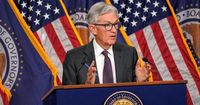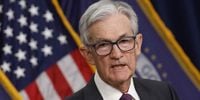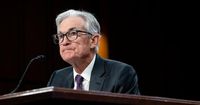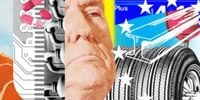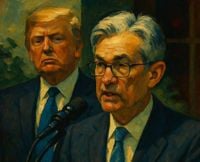Federal Reserve Chairman Jerome Powell addressed a gathering of business journalists on Friday, April 4, 2025, at the Society for Advancing Business Editing and Writing conference in Arlington, Virginia. His remarks came amid heightened market uncertainty following President Donald Trump's aggressive new tariffs on U.S. trading partners.
In his speech, Powell warned that the tariffs, which are "larger than expected," could lead to increased inflation and slower economic growth. He emphasized the significant economic implications these tariffs may have, stating, "While uncertainty remains elevated, it is now becoming clear that the tariff increases will be significantly larger than expected." This sentiment reflects the growing concerns among economists and investors about the potential fallout from the tariffs.
Starting Saturday, April 5, a minimum 10% tariff will be imposed on all imports of foreign goods, a move that many believe could have immediate and long-term effects on the economy. Furthermore, on April 9, the Trump administration plans to implement higher, individualized tariffs ranging from 48% to 10% on countries with which the U.S. has significant trade deficits.
Powell's remarks were particularly timely, as March's labor report indicated the economy added 228,000 jobs, bringing the unemployment rate down to 4.2%. However, Powell noted that the economic outlook is clouded by the risks associated with these tariffs, stating, "We face a highly uncertain outlook with elevated risks of both higher unemployment and higher inflation." He added that these developments could undermine the Federal Reserve's dual mandates of maintaining 2% inflation and maximum employment.
In the context of rising inflation, Powell mentioned that tariffs are likely to generate at least a temporary rise in prices. He cautioned, however, that the effects could become more persistent if inflation expectations are not kept well anchored. Powell stated, "Our obligation is to keep longer-term inflation expectations well anchored and to ensure that a one-time increase in the price level does not become an ongoing inflation problem."
Global markets have already reacted negatively to Trump's tariff announcements, with major U.S. stock indexes losing approximately 10% since the tariffs were first introduced. Powell's comments came amid this turmoil, as investors grappled with the implications of the administration's trade policies. Stocks continued to slide following his remarks, highlighting the market's sensitivity to economic forecasts and policy changes.
In light of these developments, Powell indicated that the Federal Reserve is prepared to wait for more data before making any adjustments to monetary policy. He noted that markets are currently pricing in four or five interest rate cuts this year, a significant shift from previous expectations. Just weeks ago, the Fed had opted to hold its benchmark interest rate steady, signaling a cautious approach to the uncertain economic landscape.
Powell's address also touched on the potential for retaliatory measures from other countries, particularly China, which announced retaliatory tariffs of 34% on all U.S. goods in response to Trump's trade policies. This escalation in trade tensions could further complicate the economic outlook, as other nations react to the U.S. tariffs with their own restrictions.
As the Federal Reserve navigates these turbulent waters, Powell emphasized the importance of monitoring both hard economic data and softer indicators, such as business sentiment and surveys. He stated, "We are closely watching this tension between the hard and soft data. As the new policies and their likely economic effects become clearer, we will have a better sense of their implications for the economy and for monetary policy."
The Fed's approach will be critical in the coming months, as it seeks to balance the risks of inflation against the potential for slower growth. Powell's remarks underscore the complexity of the current economic situation, where rising prices and a fragile labor market could create a difficult environment for policymakers.
In summary, Powell's speech highlighted the elevated risks posed by Trump's tariff policies, which could lead to higher inflation and slower growth. As the Federal Reserve continues to assess the situation, investors and economists alike will be watching closely for any signs of change in monetary policy or economic performance.
